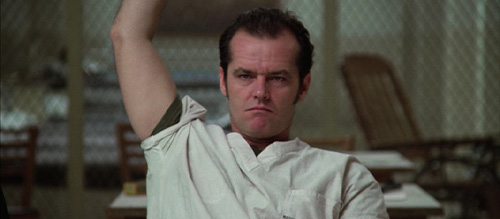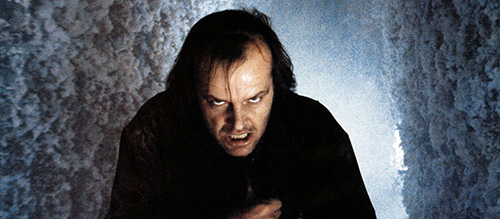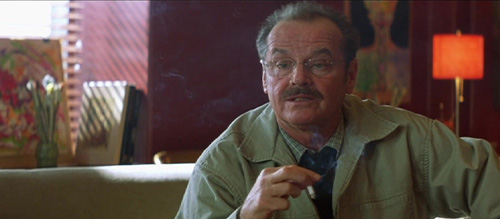Jack Nicholson: 3 Career-Defining Performances
Jack Nicholson is one of Hollywood’s greatest actors. At the core of his decades-spanning reputation is his ability to summon every ounce of emotion and fill the screen with spirit, passion, and a brooding sense of audacious intensity. Nicholson embodies each of his roles with such ferocity that he simply dominates the frame and becomes the main attraction; no matter what the scene entails, we each uncontrollably root for him, whether he plays the good or the bad guy.
During a five-year stint between the National Guard and active military duty, Nicholson began to train with the Players Ring Theatre, which enhanced his burgeoning desire for a life in front of the camera. He soon booked the lead role in Roger Corman’s The Cry Baby Killer (1958). Minor roles in Corman films such as The Little Shop of Horrors (1960), The Raven (1963), and The Terror (1963) followed. However, after the casting agents stopped calling, Nicholson wrote scripts for films such as The Trip (1967) and Head (1968). Only a mere year after setting sights on a career behind the scenes, Nicholson got his big acting break in Easy Rider (1969), playing a troubled lawyer and earning himself his first Academy Award nomination.
After Easy Rider, Nicholson became a blockbuster name and honed in his anti-hero character work in films such as Five Easy Pieces (1970) and Chinatown (1974). Throughout the following decades, Nicholson clarified his stardom, becoming known for delivering bold performances that propelled whatever movie he featured in.
Nominated for twelve Academy Awards – three of which he won – Jack Nicholson is the most-nominated male performer in Oscars history. With such notoriety and acclaim, and a further fifty-plus feature performances to his name, Jack Nicholson is now renowned for his individualistic style and consistent quality of performance. What follows is The Film Magazine’s guide to this legendary actor’s most defining work: Jack Nicholson’s 3 Career-Defining Performances.
Follow @thefilmagazine on Twitter.
1. One Flew Over the Cuckoo’s Nest (1975)

Near the beginning of Jack Nicholson’s stampede of success, actor Michael Douglas acquired the story rights to Ken Kesey’s 1962 novel “One Flew Over the Cuckoo’s Nest”, a tragic tale of what goes on behind the scenes at a strict mental institution. Nicholson played Randle McMurphy, a worker transferred from an institutional work farm to a psychiatric hospital.
The film takes on heavy themes such as friendship, freedom, and stigmatism against disabilities. It imparts them against the backdrop of authoritarian rule to unveil the ingrained cruelness that society holds over those deemed problematic. Randle’s journey begins with his bravado overshining the constrictive institutional environment, clashing with the staff, as he slowly develops an understanding of what true horrors lie within the walls of a should-be-safe place. By the finale, he has gone through the most inhumane of circumstances.
To exhibit such conflicting emotions, from valiant determination to asserting a feeble weakness, is a daunting task that many actors would be unable to face with the same genuineness that Nicholson employs. Despite the incredible script and commendable supporting performances, One Flew Over the Cuckoo’s Nest would not be the same classic piece of cinema it is now without Nicholson’s admirable ability to put on such a raw display.
2. The Shining (1980)

Malcolm McDowell may have been the first to don the intense direct stare at the camera (in A Clockwork Orange), but Jack Nicholson’s deadly glare as his character’s (Jack Torrance’s) psyche fully unravels is the most infamous and compelling example of the Kubrick Stare.
The Shining is often considered one of the scariest films of all time and acclaimed filmmaker Stanley Kubrick’s best contribution. Like any film falling under those two categories, a powerful performance is at the core of its success. With Torrance’s arc carrying a burdensome intensity, no other actor was more fitting for the job than Nicholson.
Nicholson quickly hits every stylistic beat with his haunting Kubrick Stare, menacing smile, and aptly sinister furrowed brow. His performative flair has become synonymous with The Shining’s ominous and disturbing aesthetics. His dramatic portrayal of an unhinged man at the end of his tether compliments his expressive performance, making for a profoundly unforgettable experience.
Contributing to this career-defining performance is Nicholson’s employment of method acting. The actor would spend countless hours fleshing out his character with co-star Shelley Duvall, mediating their on-screen relationship’s early days and hurdles. Further expanding upon Torrance’s depth, Nicholson constantly remained in character, cutting his rest time to appear agitated and on edge.
In proper Nicholson form, The Shining sees the actor sweep us off our feet, captivating our gaze and ultimately dominating the screen.
3. The Pledge (2001)

After The Shining, Jack Nicholson continued his stampede of award-winning roles, including his standout performance in As Good as It Gets (1997), a warm romantic ’dramedy’. However, one film that consistently slips through the cracks during the latter stages of his career is The Pledge, a harrowing, sorrowful, and stirring story of Jerry Black, a veteran detective determined to solve a young girl’s murder.
The Pledge sees Nicholson in his rarest role, tackling a character with his classic punch of brutal power, but with a sense of delicacy and tenderness that shows off his ability to portray raw melancholy.
The role of a muddle-minded detective whose soul has become so entrenched in an unsolved case is not unfamiliar to the thriller genre, with films such as Seven (1995) and Prisoners (2013) immediately springing to mind. And whilst these alternatives each feature stellar performances, Nicholson goes above and beyond to create an intricately woven, detailed portrayal that makes his persona disappear; you don’t see Nicholson playing a role, you see Det. Jerry Black, a ‘real’ person. The barriers between screen and reality are broken as we become immersed in Nicholson’s heart-wrenching study of a man swallowed by the harsh truths surrounding him.
Recommended for you: Shelley Duvall: 3 Career-Defining Performances
Over the years, Jack Nicholson has proven his capabilities, carefully curating his performances to conjure the most explorative and rounded acting portfolio ever seen. The sheer quantity of appearances made throughout his career is undoubtedly impressive. Still, more than anything, it is the absolute emotive force seen in every role he undertakes that makes Jack Nicholson one of the true greats.

